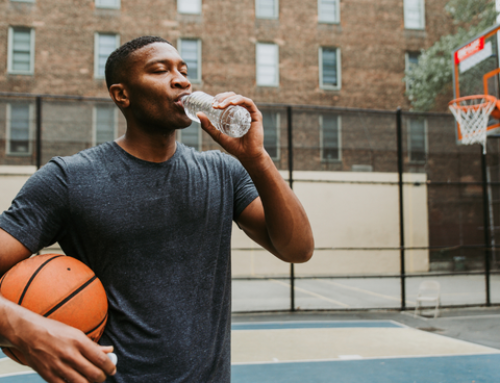Tips to Avoid Dehydration
Staying hydrated is too often an afterthought for athletes, but it really should be a primary concern. The body needs water to make energy, detoxify waste materials from exercise, lubricate joints and regulate body temperature.
As little as 2 percent dehydration can hurt your performance. Here are some ways to avoid it.
Drink the right amount of fluids.
The more water you have in your body, the more hydrated you are. Generally speaking, the optimal hydration range is 50 to 70 percent of body weight. To maintain that level, a person who does little physical activity should drink a minimum of 2 liters of water daily. If you exercise, you should drink an additional 400 to 800 ml of water per hour of activity. Aim on the higher side if you are doing endurance exercises, especially in the heat.
Don’t wait until you’re thirsty to hydrate.
Thirst is your body’s way of telling you that you’re dehydrated. So if you’re thirsty, it’s already too late—your body can’t meet its energy demands, and you’ve compromised your performance.
Know the signs of dehydration.
Symptoms include dry mouth, dark yellow urine, constant thirst, dry skin, and fatigue accompanied by headaches.
Weigh yourself before and after exercise.
If you have lost a pound of body weight, you are down about 750 ml of water.
Drink mostly filtered water, but know about other sources.
You can get water from certain foods. Fruits and vegetables contain reasonable amounts of water, especially in their raw form. Certain additives like electrolytes can be useful for speeding hydration and adding potassium, sodium, and magnesium, but none of it matters unless you drink water as your starting point.
Read more:
[cf]skyword_tracking_tag[/cf]RECOMMENDED FOR YOU
MOST POPULAR
Tips to Avoid Dehydration
Staying hydrated is too often an afterthought for athletes, but it really should be a primary concern. The body needs water to make energy, detoxify waste materials from exercise, lubricate joints and regulate body temperature.
As little as 2 percent dehydration can hurt your performance. Here are some ways to avoid it.
Drink the right amount of fluids.
The more water you have in your body, the more hydrated you are. Generally speaking, the optimal hydration range is 50 to 70 percent of body weight. To maintain that level, a person who does little physical activity should drink a minimum of 2 liters of water daily. If you exercise, you should drink an additional 400 to 800 ml of water per hour of activity. Aim on the higher side if you are doing endurance exercises, especially in the heat.
Don’t wait until you’re thirsty to hydrate.
Thirst is your body’s way of telling you that you’re dehydrated. So if you’re thirsty, it’s already too late—your body can’t meet its energy demands, and you’ve compromised your performance.
Know the signs of dehydration.
Symptoms include dry mouth, dark yellow urine, constant thirst, dry skin, and fatigue accompanied by headaches.
Weigh yourself before and after exercise.
If you have lost a pound of body weight, you are down about 750 ml of water.
Drink mostly filtered water, but know about other sources.
You can get water from certain foods. Fruits and vegetables contain reasonable amounts of water, especially in their raw form. Certain additives like electrolytes can be useful for speeding hydration and adding potassium, sodium, and magnesium, but none of it matters unless you drink water as your starting point.
Read more:
[cf]skyword_tracking_tag[/cf]











